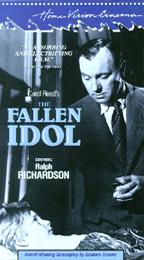FILM NOTES
FILM NOTES INDEX
NYS WRITERS INSTITUTE
HOME PAGE

(United Kingdom, 1948, 95 minutes, 95 color, 16mm)
Directed by Carol Reed
Cast:
Ralph Richardson . . . . . . . . . . Baines
Michèle Morgan . . . . . . . . . . Julie
Sonia Dresdel . . . . . . . . . .Mrs. Barnes
Bobby Henrey . . . . . . . . . . Phillipe
The
following film notes were prepared for the New York State Writers
Institute by Kevin Jack Hagopian, Senior Lecturer in Media Studies
at Pennsylvania State University:
There have been few teamings in the history of film as fortuitous as that of director Carol Reed and novelist Graham Greene. Their 1949 masterpiece of desolated postwar Vienna, The Third Man, is among the most literate of all films, wry, funny and tragic in the same instant. Our Man in Havana, from 1959, is a chilly time capsule of Cold War moral ambivalence and dark humor. Both films remain undisputed high points in the cinema of intellect and politics. But the first Reed-Greene collaboration, 1948’s The Fallen Idol, is now relatively neglected. It certainly wasn’t neglected in its own day. Critics were unanimous in their praise, and the film earned Oscar nominations for Best Director and Best Screenplay, and gave Reed his second of three consecutive British Film of the Year awards. (The first had been for Odd Man Out, and the third would be for The Third Man.)
All it takes is a first look at The Fallen Idol to know instantly that the critics got it right. The Fallen Idol tells the story of Baines (Ralph Richardson) butler to a great house, but also friend, mentor and a shining, romantic figure in the eyes of his hero-worshipping young charge, Phil (Bobby Henrey). Phil’s own parents are often absent, and so psychologically remote that, even where they’re there, they’re not really there. Phil has attached himself to Baines, and Baines is proud, rather than annoyed at the boy’s devotion. But then, a monstrous event intervenes to put Baines in jeopardy, and test their friendship.
The film is told from the viewpoint of Phil. There is nothing coy about this choice in narration, however; for Reed, childhood carries with it the flavor of the surreal, and a tang of dangerous lying. Phil sees the world, literally, through a canted frame. George Perinal’s cinematography is loaded with Dutch angles and floor-level gazing. The big mansion Phil and Baines dwell in becomes visually unstable, haunted by the accusations and recriminations which poison their relationship. This is a dark, endlessly mysterious film, just as challenging to audiences now as it was in 1948 – and just as rewarding, for this is a film which offers flourishes of style at every turn, in acting, cinematography, scene design, and editing. Few films have made the feeling of dread the source of such a consistent aesthetic vision, or of such a compelling ethical drama, as The Fallen Idol.
Greene himself didn’t think it could be done. His short story, "The Basement Room," on which the film was based, was one of the most despairing and pessimistic works of an author who was consistently obsessed with themes of guilt and failed redemption. Green shook his head at Reed’s enthusiasm for the project: "It seemed to me that the subject was unfilmable –a murder committed by the most sympathetic character and an unhappy ending which would certainly have imperiled the £250,0000 that films nowadays cost." Reed acknowledged these obstacles, and set about hurdling them. In crafting a screenplay, he and Greene altered the outlines of the story, chiefly by reassigning the meaning of the story’s motivating incident, a murder, to another source entirely. Reed’s biographer Robert F. Moss has rightly said that this decision, and the interest the film displays in clues and the mechanics of detection, changed the film from a strictly psychological study to a sophisticated variation on the drawing-room murder mysteries so beloved of English writers and filmmakers. But genre is no restriction on quality, for as Moss also notes about The Fallen Idol, "this is a thriller with an uncommonly high IQ."
Along with the long Viennese shadows of The Third Man and the tropical perversities of Our Man in Havana, the cold comforts of the ambassadorial mansion in The Fallen Idol complete the dense, eerie moral scenography of Carol Reed and Graham Greene’s remarkable partnership.
— Kevin Hagopian, Penn State University
This film is screened in honor of the centenary of Graham Greene's birth on October 2, 1904.
For additional information, contact the Writers Institute at 518-442-5620 or online at https://www.albany.edu/writers-inst.
 Fallen Idol
Fallen Idol